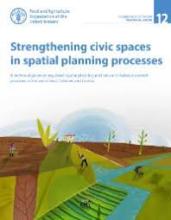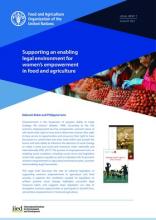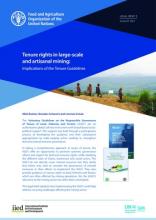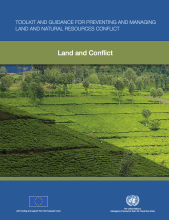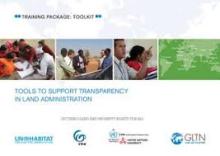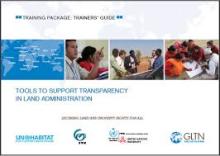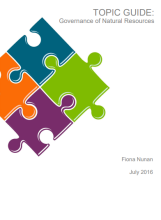Resources for Civil society
Strengthening civic spaces in spatial planning processes
This technical guide provides strategies on how to strengthen, protect and promote legitimate tenure rights in spatial planning processes at the local, regional and national levels. It addresses state authorities involved in spatial planning processes, national governments and local authorities, and those operating on behalf of the state or within customary governance systems.
Supporting an enabling legal environment for women’s empowerment in food and agriculture
Empowerment is the “expansion of people’s ability to make strategic life choices”. According to the UN, women’s empowerment has five components: women’s sense of self-worth; their right to have and to determine choices; their right to have access to opportunities and resources; their right to have the power to control their own lives, both within and outside the home; and their ability to influence the direction of social change to create a more just social and economic order, nationally and internationally. The process of empowerment rests on enabling social conditions including social norms and legislative action that supports equality as well as individual will. To promote women’s empowerment in agriculture and food security, countries need enabling legal frameworks.
Tenure rights in large-scale and artisanal mining: Implications of the Tenure Guidelines
In taking a comprehensive approach to issues of tenure, the Voluntary Guidelines on the Responsible Governance of Tenure of Land, Fisheries and Forests (VGGT) offer an opportunity to promote systemic governance reform and respect for land and resource rights, while clarifying the different roles of States, businesses and social actors. The VGGT do not directly cover mineral resources but they clarify that States may wish to consider the governance of mineral resources in their efforts to implement the VGGT. They also provide guidance on tenure rights to land, fisheries and forests, which are often affected by mining operations. Yet, the VGGT’s relevance to the mining sector has often been overlooked.
This legal brief explores how implementing the VGGT could help address recurring challenges affecting the mining sector.
Tip Sheet for Journalists Covering the Impacts of the Coronavirus Pandemic on the Extractive Sector
This compilation of resources aims to help journalists cover the medium- to long-term impacts of the global pandemic on the governance of the oil, gas and mining industries in resource-rich countries. It includes blog posts with media-relevant resources such as good examples of existing coverage, suggested story angles and data sources.
Toolkit and Guidance for Preventing and managing Land and Natural Resources Conflict - Land and Conflcit
This guidance note provides a framework for understanding and addressing land and natural resource-related grievances and conflicts through a holistic, systematic approach. While the main emphasis is on violent conflict, it may also be useful in a variety of other situations characterized by significant land-related grievances, but which are not currently or openly violent. It is intended for staff of multilateral organisations, national and local governments, and civil society organisations.
Toolkit on the Inter-American human rights system for indigenous women
This toolkit contains a series of information notes explaining different aspects of the Inter-American human rights system. It is designed to help indigenous women and their advocates to use the system effectively.
Toolkit on the Inter-American human rights system for indigenous women
This toolkit contains a series of information notes explaining different aspects of the Inter-American human rights system. It is designed to help indigenous women and their advocates to use the system effectively.
Tools to Support Transparency in Land Administration : Training Toolkit
This training toolkit aims to sensitize government agents about land administration, develop their capacity to address issues of corruption and to enhance transparency in the land sector. It focuses specifically on land administration with a view to filling the capacity development gap in the land administration sector. Training content covers key themes clustered into different training sessions related to land governance, transparency, land administration and tools that could help bring about transparency. It comes with a trainer's guide.
Tools to Support Transparency in Land Administration: Trainer's Guide
This trainer's guide is complementary to this training toolkit. It is part of an approach that aims to sensitize government agents about land administration, develop their capacity to address issues of corruption and to enhance transparency in the land sector. It focuses specifically on land administration with a view to filling the capacity development gap in the land administration sector. Training content covers key themes clustered into different training sessions related to land governance, transparency, land administration and tools that could help bring about transparency.
TOPIC GUIDE: Governance of Natural Resources
This topic guide for government agencies, service providers and other practitioners examines various dimensions of governance that are key to deliver appropriate benefit-sharing, ensure sustainable exploitation, minimise conflict over access and control, and maximise the contribution of resources to economies. This includes decentralised and collaborative governance, multi-level and adaptive governance, and the roles of institutions and politics.


